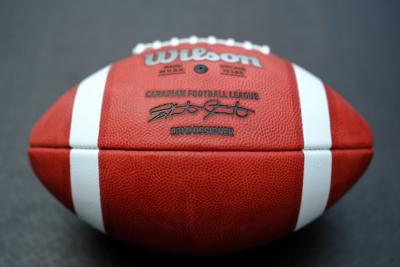A high-profile animal rights group is calling on the CFL┬Āto switch to fully synthetic footballs, alleging animal cruelty in the production of the cowskin version.
┬Āwant the league to work with sporting goods manufacturer Wilson to produce a synthetic model by 2027.
PETA says other professional sports played in similar conditions have already made the switch ŌĆö┬ĀFIFA┬Ā at World Cups in 1986, and professional rugby uses┬Ā at all levels┬ĀŌĆö and that North American football is among the last holdouts.
The CFL did not respond to the StarŌĆÖs request for comment by the time of publication.
A ball made from animal skin┬ĀŌĆö heavier and slippery when wet in bad weather ŌĆö┬Āis a negative when it comes to game performance as well as the protection of animals, according to PETA.┬Ā
ŌĆ£FIFA and rugby made the switch, I believe, based strictly on performance of the outdoor balls,ŌĆØ said Philip Schein, vice-president of PETAŌĆÖs field research.
Schein┬Āadded the organization has also called on the┬ĀNBA and college basketball to switch, but the CFL is the first football league to be approached. Among North America’s biggest leagues, only , also produced by Adidas, are made of synthetic materials. If PETA’s plea to the CFL is successful, it could set a precedent for bigger leagues such as the NFL to follow, said Schein.
PETAŌĆÖs call comes on the heels of an undercover investigation at an Ohio slaughterhouse and allegations of animal cruelty. In a letter earlier this month from PETA to CFL commissioner Stewart Johnston┬ĀŌĆö whose signature is imprinted on every football ŌĆö the animal rights group claims that about 70,000 cows are slaughtered every year to produce roughly 700,000 leather Wilson footballs.
CFL footballs already include synthetic features such as bladders, laces and stitching, but replacing the leather casing is most important, said Schein.
ŌĆ£This would be a very progressive step for the commissioner and the CFL to really distinguish themselves and be a model for animal protection,ŌĆØ he said.
According to PETA, many football players and officials aren’t aware of the allegations of animal cruelty in production, or simply want to stick with tradition and resist change.
ŌĆ£We usually find that change comes from the demand side rather than the supply side, especially because big companies are in it to make money,ŌĆØ said Hannah Schein, vice-president of PETAŌĆÖs investigations department.
ŌĆ£But Wilson already makes a huge array of synthetic footballs, and we know that they have the technology to make elite non-skin balls if they have the demand for it. We have no doubt that they can work with the CFL and the NFL to get this done.ŌĆØ






























To join the conversation set a first and last name in your user profile.
Sign in or register for free to join the Conversation